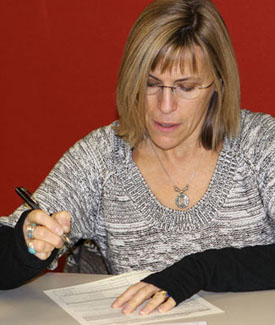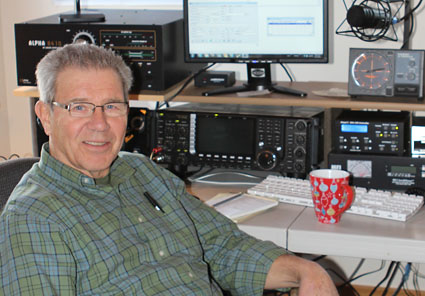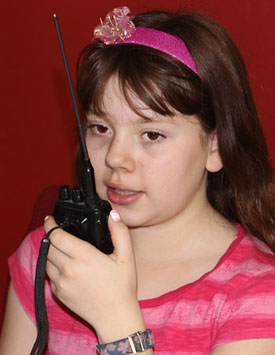home | internet service | web design | business directory | bulletin board | advertise | events calendar | contact | weather | cams

 Lori Triplett of Winthrop takes the written test for an advanced ham radio operator's license. Lori Triplett of Winthrop takes the written test for an advanced ham radio operator's license.Same Wavelength When he was a teenager living in Ohio, Ron McCollum, 70, got hooked on ham radios. He built his own transmitter and receiver, both of which he still owns, and his dad helped him put up an antenna. “I think it opened me to the world,” says McCollum of his teenage hobby. “I listened to Radio Australia in the morning before I went to school and I asked them to play ‘Waltzing Matilda’ for my mother,” he recalls with a grin. McCollum, a former stockbroker and U.S. Air Force pilot who attended the Air Force Academy on a football scholarship, was recently elected president of the Methow Valley Amateur Radio Club. He lives with his artist wife, Mary Lou, near Winthrop next to a newly-erected 55-foot high antenna. “Radio Havana, Cuba, comes in loud and clear up here,” he smiles. “I’ve always enjoyed listening to the radio,” he adds, explaining that he likes to “visualize” what he’s hearing. “I can ‘watch’ a football game on radio as easily as I can on TV.” McCollum’s passion is shared by 34 other ham radio operators in the valley - 17 living in Twisp’s zip code and 17 in Winthrop’s. They meet the third Saturday of every month at 5 p.m. at Hometown Pizza in Twisp and are among 750,000 licensed ham radio operators in the United States, 224 of them in Okanogan County. Visitors wanting to learn more about ham radio are welcome to attend or can call him at 509-996-3324, says McCollum. Information also is available at www.mvhams.com.  Ron McCollum of Winthrop is the new president of the Methow Valley Amateur Radio Club. The club meets the third Saturday of every month in Twisp. Ron McCollum of Winthrop is the new president of the Methow Valley Amateur Radio Club. The club meets the third Saturday of every month in Twisp.The valley’s youngest licensed ham radio operator is Kaity Corrigan, 10, who says, “It’s really fun.” Her parents, David and Julie Corrigan, also are ham radio operators and talked her into trying it, she said. She uses a hand-held unit, and says: “My dad helped me a lot.” It took her two tries to get her license, she explains. “I missed it by one question.” To get on the airwaves, ham radio operators must pass at least the first of three licensing tests. Simply put, the more advanced licenses give operators access to wider audiences. Recently Lori Triplett of Winthrop was among a handful of ham operators looking to pass the written second-level licensing test. “Mainly my interest is in emergency communications,” Triplett told Grist, especially when the power goes down. “A lot of the time the emergency services people need backup,” she explained, and ham radio operators can relay messages and help dispatch people to check on the welfare of people who may be stranded in their homes, for example.  Kaity Corrigan, 10, is the youngest person to have a ham radio operator's license in the Methow Valley. Kaity Corrigan, 10, is the youngest person to have a ham radio operator's license in the Methow Valley.How the club can help assist in emergencies is an ongoing topic for the club, says McCollum. “When all else fails” is a motto of ham radio operators, he adds, recalling a storm in Republic, Washington, last summer that knocked out all communications except that of the ham radios that had generators for emergency power. And when the devastating 2011 earthquake and tsunami hit Japan, he added, ham radio became a key method of communication. McCollum uses Morse code when transmitting but says “Mostly people talk. They don’t need to know Morse code.” It’s possible to get up and running to talk with people on limited spectrums for as little as a $100- $200 investment, he says. Radio technology has gone from tubes to digital, and operators can even type on a keyboard and see messages displayed on a screen. Why people who like to do this are called “ham” radio operators is in dispute. According to a Wikipedia explanation, the term was a pejorative first applied by professional radio operators, who thought the amateurs were incompetent. Other accounts say HAM was the call letter of the nation’s first amateur radio station, which became embroiled in a Congressional dispute over licensing fees. Whatever the case, today’s ham radio operators embrace the term as well as the connection they share with people in far-flung places. McCollum says he enjoys receiving and collecting the confirmation postcards that come from ham operators all over the world he’s met on the airwaves. And he adds, “Part of it is that I like to keep my brain going, too.” 12/22/2012 Comments This is really a wonderful article on Ham Radio in the Methow. I hope that folks who may be interested will come to our meetings or contact the club for more information. There is much in Amateur Radio that can benefit the community was well as simply being a fun hobby and a safety net for times (like today) when our winter weather can be a bit painful. A personal thanks to Solveig for getting this article spot on. Mike, WB6WUI
|